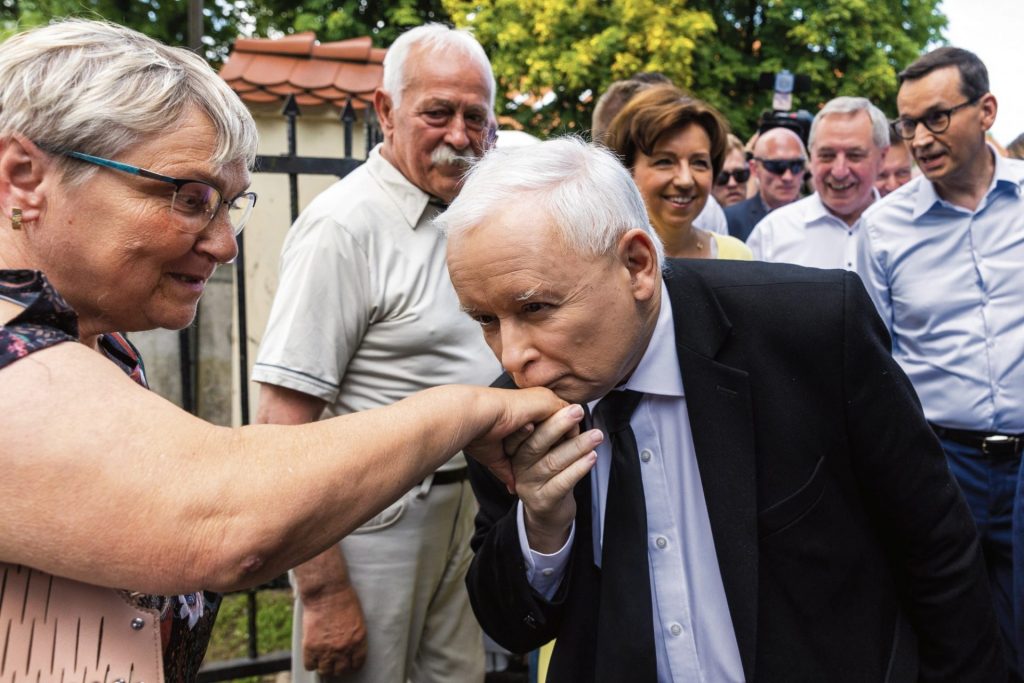Forty-three years ago, the workers, intellectuals and nearly all citizens of Poland rose as one in a peaceful revolution to end communist Soviet autocracy. Now the country may be on the eve of another peaceful revolution.
On October 15, the Polish will vote for a new government, and the polls suggest that Europe’s most important nationalist, right wing, anti-women, homophobic, anti-European party may lose power. The Law and Justice in Poland party (PiS) makes the Brexit Tories look like woke liberals. If PiS is beaten it will be a major setback to the fashionable idea that the right are on an unstoppable march across Europe.
Cheerleaders for that thesis felt vindicated by the pro-Russia populist Robert Fico coming top in elections in Slovakia. But he got only 23% of the vote on a platform of not sending a few nugatory weapons to Ukraine and will preside over a shaky coalition government.
Poland has its problems with Ukraine, but is resolutely anti-Vladimir Putin and wants to see Russia defeated. By contrast, Fico claims the war was launched by fascists in Kyiv, and a Slovak MEP for his Smer party went on BBC Radio 4 to call for negotiations between Kyiv and Moscow – exactly the line Russia’s dictator would like taken up.
Not surprisingly, PiS have been quiet on the Slovakia result – Poles know Fico’s record and with change in the air the last thing the PiS elite needs is to be seen joining hands with Smer.
In 1980, the Polish revolution took the form of creating an independent union, Solidarity, which threw the world of communism into a tizzy. How could the workers rise up against a party that claimed to represent the workers?
It took the gerontocracy in the Kremlin some time to react. When they did, it was to tell their Polish lackeys to crush Solidarity. But Poles are Poles, and when it comes to resisting bullies and liars, few nations have a stronger record in taking on seemingly all-powerful forces.
Solidarity lifted the lid of history’s dustbin and within a few years, Polish communism was dumped into it, as Poland held free elections just a few months before the Berlin Wall fell.
Free politics, however, does not always mean good politics. Before long, the PiS was up and running.
What happened next is like a demonstration of the dangers of proportional representation. The electoral system allowed alliances between the Polish equivalents of the Braverman-Truss Tories, Ukip and the BNP, along with anti-abortion religious hardliners. Between them, they mustered enough votes to form a government, first in 2005 and then again in 2015 and 2019.
PiS has nudged Poland steadily to the illiberal right on abortion, media freedom and immigration. At different times it has attacked Jews, the European Union, and neighbouring nations, such as Germany.
It was Poland’s social democratic party that took Poland into Nato in 1999 and then the EU in 2004. After this came the centre-right liberal Civic Platform government, led by Donald Tusk, which represented the Davos worldview that progress comes through economic liberalisation. In that respect, it was in step with the Cameron-Clegg alliance that had formed at the same time in Britain.
Indeed, the foreign minister in the Tusk government was Radek Sikorski, who escaped from communist Poland after 1980 and went to Oxford University, where he was in the Bullingdon Club with David Cameron and Boris Johnson. His views today on his former Bullingdon Club comrades who took Britain out of Europe are unprintable.
Tusk and Civic Platform ruled from 2007 to 2014. But like all liberal centre-right parties it ignored the needs of workers, poor farming areas, and those left behind by the business surge it had promoted.
Civic Platform was socially liberal on issues including gay rights and the rights of women, which seemed alien to Poland’s big Catholic-dominated rural communities and those who did not live in the more progressive cities.
The campaign for the 2023 general election has been vicious. Mateusz Morawiecki, the prime minister, and former Santander banker, likes to end his meetings by crying out to followers “What is in Donald Tusk’s heart?”
The crowd roars back “Germany, Germany, Germany.” This is a reference to Tusk’s background of growing up in the northern Polish town of Gdańsk, in a household where both of his parents spoke Danzig German.

Poland’s history with Germany has been turned into a live political issue. The country’s most famous movie director, Agnieszka Holland, recently produced a film called Green Border on the fate of refugees who were being pushed back by Polish and Belarusian border guards and military personnel. This led to more than 50 deaths, including of women and children. The PiS minister of justice, Zbigniew Ziobro, responded on Twitter, saying: “In the Third Reich, the Germans produced propaganda films showing Poles as bandits and murderers… Today they have Agnieszka Holland for that.”
Germanphobic statements by the Polish nationalists are reaching new depths, becoming even worse than the constant sneering about France and Emmanuel Macron by British Brexit supporters, particularly in the Spectator.
But political control of the media is much worse in Poland than in the UK. State-controlled TV, the Polish equivalent of the BBC, spends the first half of its nightly 30-minute news bulletins boosting the achievements of the PiS government and the second half attacking Donald Tusk.
Nonetheless, Tusk has moved up in the polls, to within two points of PiS, so now both parties have support in the mid-30s. The Confederation Party, set up in 2018, is a hard-right grouping of anti-European, ultra-liberals that would find favour with Liz Truss, as it wants to scrap both social security and income tax. The party also sways into territory far more extreme than anything seen in UK politics – yet. One of its senior members outlined the party’s extremist worldview, stating that: “We don’t want Jews, homosexuals, abortion, taxes or the European Union.” This radical right, nationalist and xenophobic party has the support of many young Poles, who don’t like the bossy, conservative Catholic style of the 74-year-old PiS leader, Jarosław Kaczyński. He is the deputy prime minister, but runs Poland behind the suave-suited younger politicians who have chosen PiS as the best vehicle for their political careers.
Like many on the British hard right, PiS politicians enjoy attacking the EU – but the disaster of Brexit means there is no support for Polexit. Sunak-Truss-Johnson Britain is now seen as the sick man of Europe and certainly not a guide for Poland. Also like the British hard right, Kaczyński makes a show of condemning Europe for letting too many immigrants into the EU (and the country’s PiS-aligned president, Andrzej Duda, is warning of “ further migration pressure on Europe” in the wake of Hamas’s attack on Israel).
And yet the PiS government allowed 1.35 million Ukrainians into the country to do low-paid work in the agriculture, social care and construction sectors. They have also used immigration for even more cynical purposes. A recent scandal erupted when it was found that PiS government officials had been selling hundreds of thousands of Schengen entry visas at €3,000-4,000 apiece to African and Asian migrants. They started in Poland but then disappeared across the frontier into Germany and other EU member states. The German government has partially closed its border with Poland.
The PiS prime minister, Morawiecki, has imposed a ban on grain imports from Ukraine in order to buy farmers’ votes – a direct breach of EU policy, which is to support Ukraine including through food exports. He also suggested that Warsaw would no longer allow arms exports to Kyiv to pass through Poland. The Polish government has made a show of being anti-Russian, but policies such as this give a very different impression.
On the domestic front, the PiS government has pursued a hardline conservative agenda, which has included criminalising abortion. The party has also stuffed the courts with PiS lawyers so there is no hope that any constitutional judges will reverse the ban. The female vote in this election could well be decisive. The women of Poland, including many older Catholic mothers, are unhappy about their daughters being forced to have babies, particularly as the leader of the party is himself a childless septuagenarian bachelor. Polish women are asking why they should not have the same freedoms as European women.
Journalist Eugeniusz Smolar was a young pro-democracy activist who took part in the 1968 student strikes and protests against communist rule. He was Jewish and in the last pogrom in Europe, which took place in the same year, the Polish communist government expelled 20,000 mainly young Jews. They formed a network in the 1970s that helped to drive global support for Solidarity. Smolar worked for the BBC, becoming head of Polish output on the BBC World Service, and after 1990 he returned home to run Polish state radio. Now he is in despair about his country.
According to Smolar, “Since 2015 PiS, with its allies, has ruled by fear, conflict and permanent crisis, launching unabated attacks on the laws, institutions and norms of liberal European democracy, including independent media and civil society.
“PiS has been de-legitimising the opposition and has drastically limited its influence on the legislative process in the parliament.”
Since 2015, PiS has been spreading its influence through Poland’s institutions. Just as Putin did when he tightened his grip on Russian power, PiS has sought to get its supporters, or at least like-minded individuals, into all levels of central and local government administration, including the military, security services, the foreign service, police and courts.
PiS has also subjugated public radio and TV and turned it into an aggressive, vitriolic propaganda tool. Government politicians have attacked the freedom of the commercial media, taking over some outlets.
“PiS introduced nationalistic orthodoxy in the curriculum at schools and in the cultural institutions it controls,” Smolar said. This has included taking control of theatres and museums. In this new, rewritten, government-authorised history, “the always heroic Poles could do no wrong. Academic or journalistic research and debates on past policies and behaviours towards the Jews, Ukrainians or refugees amount to the attack on the Polish nation that could be prosecuted by law.”
The forthcoming Polish election will be the most important signal on the future of Europe since Brexit. Britain is irrelevant to Europe now – but Poland is not, and the current government’s hard-right, nationalist policies are not compatible with the country’s EU membership.
In 1920 Poland defeated the invading Red Army that was sent by Lenin to conquer Europe. In 2023, Poland could open the door to a new political future, by electing a government that rejects the values and principles that have been at the heart of the European project since 1950.
Denis MacShane is the former minister for Europe who helped to bring Poland into the EU.



